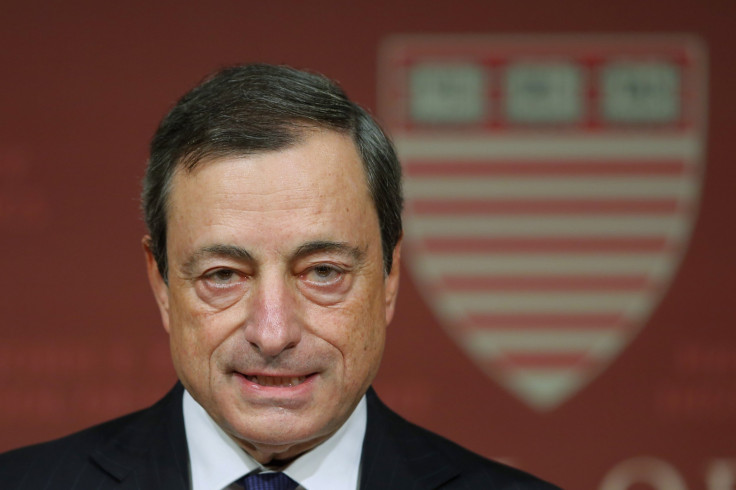Europe's Central Bank Now Charging Banks To Hold Deposits

The European Central Bank is now charging its customers, the world’s biggest banks, to hold their money rather than paying them interest, in an effort to encourage them to lend to consumers and promote spending to help the euro zone economy grow.
Neil Irwin at the New York Times' Upshot blog described negative interest rates thusly, "When a bank pays a 1 percent interest rate, it’s clear what happens: If you deposit your money at the bank, it will pay you a penny each year for every dollar you deposited. When the interest rate is negative, the money goes the other direction. Put bluntly: Normally the banks pay you to keep your money there. Under negative rates, you pay them for the privilege.”
Speaking after the news was released, ECB chief Mario Draghi said at a press conference, "We think it is a significant package," he said. "Are we finished? The answer is no. If need be, within our mandate, we aren't finished here."
The move is not expected to trigger moves by Europe’s banks to impose a similar tariff of their customers but may pose a psychological threat for customers.
“The recent example of negative interest rates in Denmark suggests that banks will not change retail interest rates, which would seem to represent a third rail as far as the general public is concerned. But this precedent for a major currency is likely to get a lot of media play, which has the potential to make depositors deeply uncomfortable even if they see no immediate change in their bank’s product pricing,” Yves Smith at the nakedcapitalism.com blog wrote on Thursday. “The long-term impact of lowering the level of trust in the financial regime may be much greater than the experts anticipate,” she said.
The effort is an attempt to get inflation to rise and to avoid its feared sibling, deflation.
As the New York Times put it, “The fear is that the minuscule rises in wages and prices could lapse into outright declines — an economically debilitating condition known as deflation, which is characterized by a downward spiral of prices, corporate profits and hiring. Deflation has already plagued the economies of several of the weaker euro zone countries, including Greece.”
Draghi said last month, “What we need to be particularly watchful for at the moment is, in my view, the potential for a negative spiral to take hold between low inflation, falling inflation expectations and credit, in particular in stressed countries.”
The ECB’s mandate is for a euro zone consumer price inflation rate of “close to but just below 2 percent,” and at just 0.5 percent in May, the inflation rate is no longer at a level consistent with that target.
“They have to do something to address weak inflation. Investors are expecting them to keep alive the option of more unconventional measures like quantitative easing,” Nick Matthews, senior economist at Nomura International Plc in London, told Bloomberg News ahead of the bank’s announcement.
Quantitative easing is when a central bank buys its nation’s issued debt in an effort to slash bond yields, which move in the opposite direction of bond prices, and thus -- theoretically, at least -- make it cheap for businesses to borrow so they can expand their operations and hire more people.
Most experts don’t expect QE, as the policy is known, from the ECB, because unlike the U.S. and other countries where it’s been tried the euro zone zone has 18 members all with their own debt, and deciding which to buy poses tricky issues.
“The risks surrounding the economic outlook for the euro area continue to be on the downside. Geopolitical risks, as well as developments in emerging market economies and global financial markets, may have the potential to affect economic conditions negatively,” Draghi said Thursday.
© Copyright IBTimes 2024. All rights reserved.












